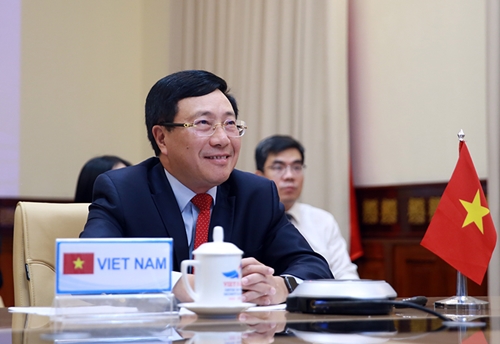The plan aims to assign tasks and responsibilities to relevant agencies and organizations, decide on measures related to direction and administration, and other measures to implement this agreement fully and effectively.
    |
 |
|
Permanent Deputy Prime Minister Pham Binh Minh signs a decision approving a plan on the implementation of the Regional Comprehensive Economic Partnership. |
Accordingly, ministries, ministerial-level agencies, Governmental agencies, People's Committees of provinces and centrally-run cities will step up dissemination of information about RCEP and legal documents revised, supplemented, annulled or promulgated to implement the agreement for relevant entities, especially those that may be affected such as the business community, industry associations, cooperatives, management agencies at the central and local levels, and workers through the media, websites, publications, documents, training courses, seminars, and dialogues.
Attention will be paid to improve and intensify the provision of information and forecasts about import and export markets as well as the domestic market to help Vietnamese enterprises understand more about the information, technical requirements and import-export management regulations of RCEP signatories, thus facilitating their making and implementation of business and investment strategies.
Ministries, sectors and localities will build programs to support and improve competitiveness for industries and businesses, especially micro-, small- and medium-sized ones, cooperatives, and farmer households in accordance with international commitments; and prepare response solutions and support policies for industries that are affected greatly and directly from the implementation of the agreement.
The plan also stresses the importance of focusing on restructuring agriculture, digital transformation, application of science and technology and advanced production models so as to improve product quality and traceability, and protect the environment, thus helping meet national and international standards.
Signed in November 2020, RCEP brings together 10 ASEAN member states, along with China, Japan, the Republic of Korea, Australia and New Zealand, covering 30 percent of the global gross domestic product (GDP) worth USD 26.2 trillion.
It forms a market with 2.2 billion consumers, and becomes the largest free trade area in the world in terms of population. It will eliminate tariffs on as much as 92 percent of goods traded between its signatories eventually, expand market access for investment, harmonize rules and regulations, and strengthen the supply chains within the massive free trade zone.
Source: VNA